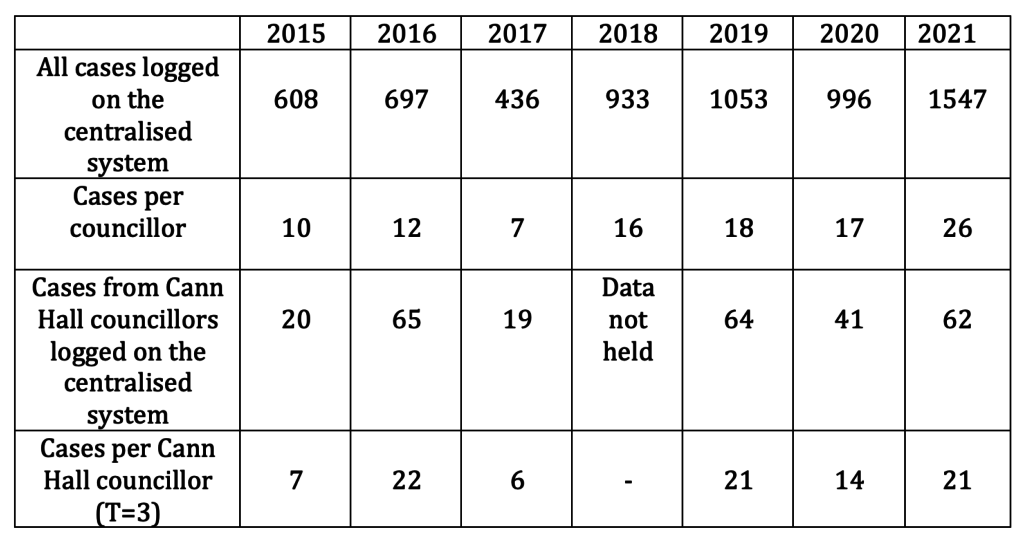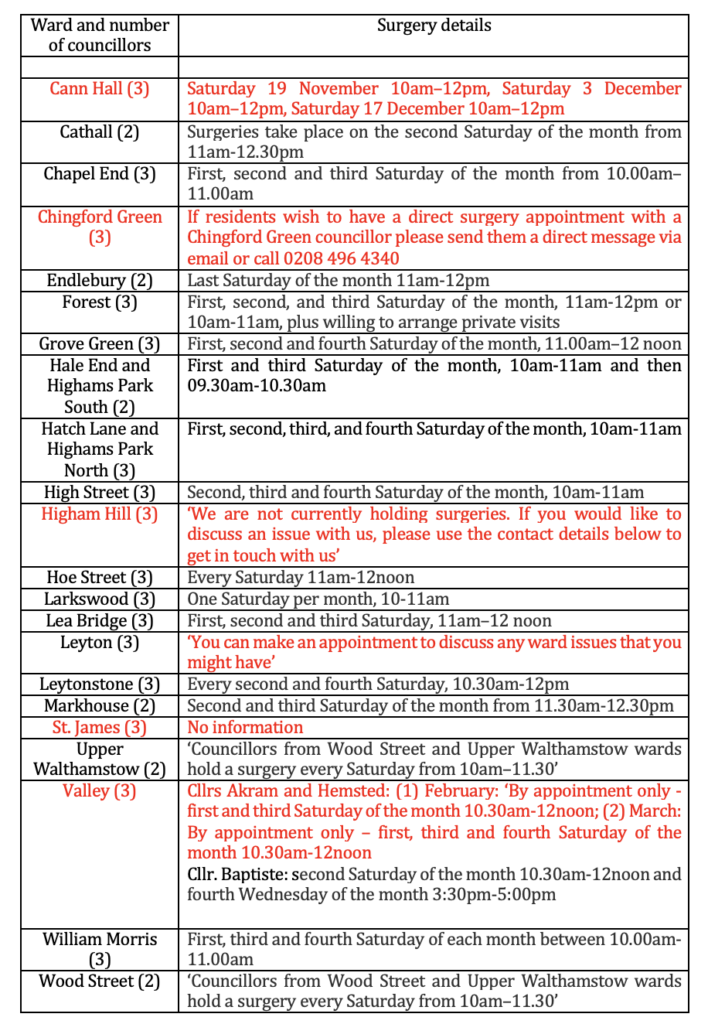LBWF councillors: what do they do, and is it value for money? An update.
In essence, the relationship between residents and councillors is an informal contract.
Residents agree to pay councillors from the public purse
For their part, councillors, amongst other things, attend (and in some cases chair) council meetings; read and digest the associated minutes and papers; promote the interests of those who live in their wards, or at least make sure they are not left behind; and help any residents in need of assistance.
A post published in February 2020 looked at how this arrangement was going, and the following is an update.
To start with, what do councillors receive in terms of remuneration?
Remuneration
All councillors receive a basic allowance, and on top of that there are special responsibility allowances (SRAs) for the Leader and her team, Cabinet portfolio holders, committee chairs, whips, etc..
Current figures are yet to be published, but in 2021-22, the basic allowance was £11,550.19, generous by London-wide standards; while 36 councillors (that is more than half the total number) received SRAs, which together were worth £515,070.
To understand what a difference the latter makes, take Councillor Keith Rayner, who has come to the attention of this blog before because of his shyness about paying council tax (see link).
In 2021-22, he received the basic allowance of £11,550.19, plus £10,457.62 in SRAs, which meant that, with employer on-costs of £1,816.60, his total package was worth a grand total of £23,824.41, not a king’s ransom, true, but hardly insignificant either.
However, in addition to allowances, councillors can – quite legitimately, it must be emphasised – leverage their positions to generate a range of other rewards.
During 2015, this blog noted:
‘a detailed investigation by the Camden New Journal in 2012 concluded that Cllr. Loakes annual earnings comprised £32,000 from LBWF and nearly the same amount again from “allowances for chairing other inter-related bodies” – not bad for someone who only a very few years before had been “a junior civil servant in the Department of Work and Pensions”. Similarly, Cabinet member Cllr. Marie Pye, a flattering pen portrait revealed, was not only employed by Goss Consulting Ltd., but held a variety of other positions (including “Lead for London Councils on Equality”, member of the Transport for London Independent Disability Advisory Group, and adviser to the Equality Committee At the Bar Standards Board), and in addition “regularly” undertook “detailed peer reviews and assessments of local authorities and housing organisations”, presumably not something she did for free’.
No doubt in later years others have followed similar paths, though interestingly, despite the ongoing growth of consultants and quangos of every kind, it is not much acknowledged, the saga of ex-Leader Clare Coghill’s metamorphosis as a property developer (see link), to take one example, emerging only after dogged investigation.
Beyond the strictly material, there also are opportunities on offer in terms of political advancement. For example, councillors who wish to ascend their party’s hierarchy, maybe become MPs, will know that service in local government stands them in good stead, in fact it is almost like serving an apprenticeship. Moreover, Town Hall work in itself offers ample opportunities to network with like-minded colleagues outside Waltham Forest.
Similarly, for councillors with overseas heritages, securing a public position in somewhere as internationally well known as London may prove extremely useful when seeking preferment in diaspora organisations or bolstering longer term status back home.
The reality, in other words, is that remuneration can come in many forms
Councillors’ workload
Assessing concisely what councillors actually do, and whether they do it well, is not easy for obvious reasons, but the following metrics provide a useful insight.
(1) Attendance at council meetings
The council has 60 elected members (one of whom is mayor, and therefore excluded from the data that follow).
Year on year, each councillor is scheduled to attend a number of meetings, encompassing full Council, and whichever of its various committees the leadership appoints them to.
So one obvious question to ask is whether councillors are diligent in attending their allotted meetings.
Looking at the most recently available annual returns, which cover the period 30 August 2022 to 22 February 2023, reveals that 23 councillors (39 per cent of the total) had perfect attendance records, while 36 (61 per cent of the total) did not, with 19 missing one meeting, nine missing two meetings, seven missing three meetings, and one missing four meetings.
That’s revealing in itself, but it doesn’t tell the whole story, because councillors have very different workloads. For example, in this period, Cllr. Sweden was scheduled to attend 16 meetings, Cllr. Lyons only three.
The list below acknowledges this point, by re-working the figures already quoted to show, for councillors who missed meetings, what proportion of their scheduled meetings these missed meetings represented:
No. of councillors who missed 0-9 per cent of their scheduled meetings: 9
No. of councillors who missed 10-19 per cent of their scheduled meetings: 15
No. of councillors who missed 20-29 per cent of their scheduled meetings: 13
No. of councillors who missed 30-39 per cent of their scheduled meetings: 3
No. of councillors who missed 40-49 per cent of their scheduled meetings: 1
No. of councillors who missed 50-59 per cent of their scheduled meetings: 2
The bottom line is that 19 councillors – about a third – missed 20 per cent or more of their scheduled meetings, surely something that in many other walks of life would be judged unacceptable.
(2) Casework
Residents contact councillors in various different ways, with various kinds of problems.
Some problems easily can be resolved. Others require more specialist help, and in these instances, councillors can request the assistance of an officer via the centralised casework management system.
Data for 2015-2021 obtained under the Freedom of Information Act give an idea of the magnitudes involved:
At first sight, the total volume of cases, and its growth over time, seems to suggest that this must be an area of work that has imposed a substantial burden on councillor time.
Yet as the cases per councillor figures show, the reality is rather different. Indeed, even in the peak year of 2021, each councillor, on average, was dealing with just 26 cases, that is, about two a month.
And of course, such average figures hide significant variations ward by ward, so that, for example, in Cann Hall, the annual cases per councillor figure was smaller than the borough average in four of the six years where data are available.
(3) Surgeries
The table below, based on information published by LBWF on its website (and correct as of 21 February 2023), illustrates how councillors choose to arrange surgeries, ward by ward:
First, the entries highlighted in red. It is disappointing to find that four sets of ward councillors do not run regular surgeries at all, while one set for unexplained reasons requires a prior appointment. As for Cann Hall, the entry speaks for itself, and is unfortunately no surprise given these councillors’ antics over other matters (see links below).
Turning to the rest of the entries, the scale of provision does not impress. Only four sets of ward councillors hold surgeries every week; almost all surgeries occur on a Saturday, none on workday evenings; and each councillor averages as little as one hour of surgery time a month.
Of course, councillors will point out that they also can be reached by e-mail and phone, with their details listed on the LBWF website.
Yet such contact may be easier said than done. The LBWF website is difficult to navigate at the best of times, while residents often have complained to this blog (attaching evidence) that, anyway, some councillors routinely ignore phone calls and e-mails, and no amount of further effort or pleading makes any difference.
Conclusion
One striking finding of this survey is that though all councillors receive reasonable remuneration, their performance in terms of the three metrics studied varies considerably.
In other words, while some councillors carry out their duties with admirable commitment, others seem to do the bare minimum, perhaps tailoring the job to their other interests.
Currently, LBWF states that it wants to empower residents in their neighbourhoods, and is in listening mode.
If it is serious, it should initiate a discussion about whether the standards that councillors work to perhaps need to be more rigorous.
Should those who miss more than a small proportion of their scheduled meetings be subject to escalating disciplinary action?
Does the fact that some councillors refer fewer than average cases to the centralised management system accurately reflect the low incidence of serious problems in their wards, or the less palatable fact that they are not making themselves much available to residents?
Should all sets of ward councillors run surgeries every week? Should the surgeries be spread across different days, rather than always being held on a Saturday?
And when councillors are contacted by phone or e-mail, should they be expected to reply within, say, 10 working days?
If consultation occurred on these kind of issues, that really would be something.



Maria - March 21, 2023, 4:36 pm
Unfortunately, these overpaid Councillors don’t seem to realise they are being “paid” to represent their constituents. They may have gone into all of this with the right attitude, but… (hey ho…).
Easy money for a lot of them without doing very much. My Councillor is “very nice” but really very ineffectual.. but it doesn’t really matter, because he gets paid anyway!